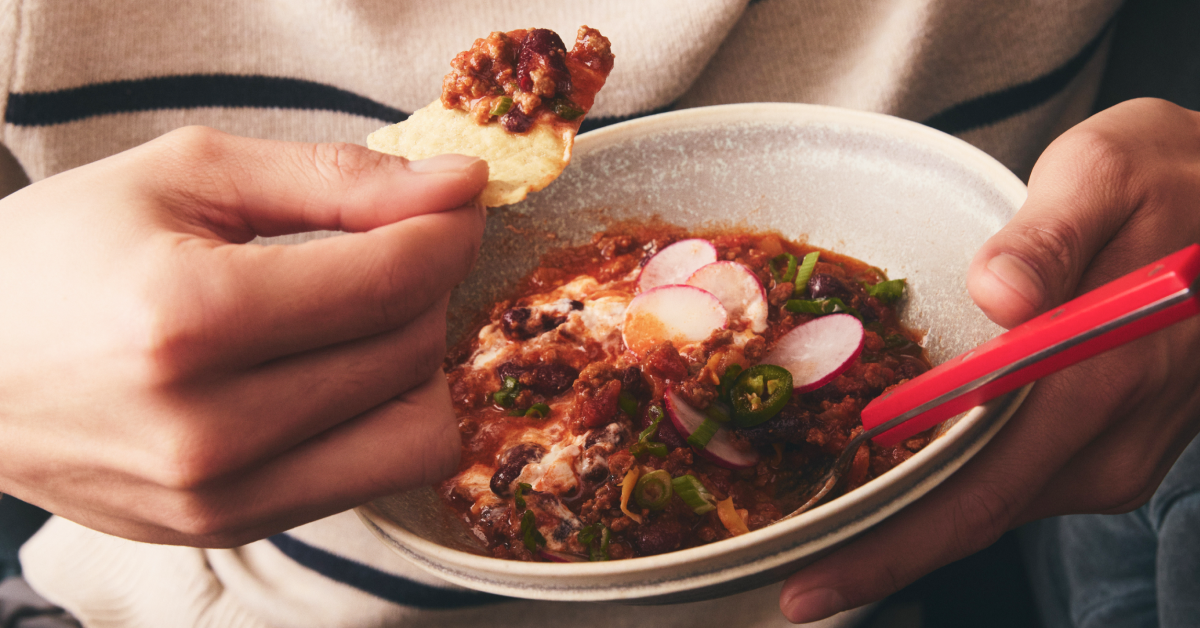How to eat more intuitively


If you think of the word intuition, you may think of that feeling you get in your gut. It can feel like an instinct, or a hunch that seems to exist without thought or reason. When it comes to eating, however, your intuition might be a little harder to hear. Babies are naturally born knowing when they’re hungry and when they’re full, but as we age that messaging gets more and more muddled. You might not know if you’re craving something because your body really needs it or for emotional reasons. Or maybe you have ignored physical hunger for so long you don’t know how to listen to it. Here’s why intuitive eating can be so beneficial and how to get back to doing it.
What is intuitive eating?
There is no single definition, but according to the National Eating Disorders Association, intuitive eating is “trusting your inner body wisdom to make choices around food that feel good in your body, without judgment and without influence from diet culture.” Yes it means eating when you’re hungry and stopping when you’re satisfied, but it also means rejecting the “restrictive diet” mentality. By embracing intuitive eating, you’ll learn to make peace with all types of food, learning to listen to your body and choose the foods you instinctively feel are right for you in that moment.
Why should you care about intuitive eating?
Learning to hear and follow your intuition as it relates to food can help you build trust with yourself again. It places you in the driver’s seat when it comes to choosing when and what to eat and can help you let go of diet-related restrictions or food rules you feel like you need to follow. Research also shows that intuitive eating is associated with improvements in self-esteem and body confidence.
7 ways to eat more intuitively
These are not hard-and-fast rules you have to follow, but are instead a way to rethink how you eat.
- Honor your hunger. When you listen to your body for the physical signs of hunger — a feeling of emptiness in your stomach, maybe some growling — you shift to eating when you first feel hungry. This helps prevent hunger spikes and helps you to make more conscious decisions with food.
- Don’t deny yourself. If you are craving something, allow yourself to eat it. When you forbid certain foods from your diet, research shows you may find yourself wanting them more and ultimately binging on them.
- Stop naming foods as “good” and “bad.” By giving food labels, you can start to feel like you are either good or bad based on how you ate — something that may cause guilt and disordered eating. Breaking free from this habit can help you return to your own intuition.
- Pay attention when you eat. Think about the way you are eating your meals now. Are you on-the-go? Are you having lunch while answering a dozen emails at the same time? While distracted eating is sometimes unavoidable, it can make it tough to listen to your body. Having a meal away from screens, sitting at an actual table, may help you get more pleasure from your food and improve satisfaction.
- Feel your fullness. Just as it's important to listen to hunger cues, it’s also important to listen to signs you’ve eaten enough. How does your stomach feel? Is it full but not uncomfortable? Pausing in the middle of your meal may help you see if you’re eating because the food is in front of you or because you’re still hungry.
- Reduce emotional eating. Everyone feels anger, anxiety, loneliness, stress, and boredom at times, and it’s natural to reach for food in those instances. But emotional eating is not intuitive eating. Yes the food may distract or comfort you, but those feelings won’t last for long. Finding kind ways to nurture and comfort yourself can help. Take a walk in the sunshine or talk with a friend — whatever brings you joy.
- Choose foods you feel work best for your body and taste buds. This might sound like an excuse to eat whatever you want and whenever you want, but that’s not really the case here. The focus is on eating a variety of foods that will supply you with nutrients your body needs to function properly. This is where listening to your body comes in. For example, eating a large plate of pasta can lead to discomfort, bloating, and sluggishness — whereas eating a medium plate of pasta paired with a side salad helps you to feel full and satisfied but doesn't weigh you down. At the same time, they should be foods you enjoy and will keep you satisfied. All foods can fit.
Can I use intuitive eating for weight loss?
Intuitive eating is not about losing weight, it’s about building a healthier relationship with food. It could help you move towards a balanced way of eating — one without restriction and binging — and help you avoid overeating when you’re full. A review of research papers on intuitive eating found that it does result in maintaining your current weight, but is not necessarily going to help you lose weight. It may help your health, though, by improving dietary intake, blood pressure, and cholesterol.
If I want to lose weight, can I still practice intuitive eating?
Intuitive eating and weight loss do not traditionally work together. Weight loss often involves intentionally choosing foods lower in calories so that you’re in a deficit. Intuitive eating, on the other hand, does not encourage you to make food choices based on calories or a desire to change your body. It wants you to make food choices in response to your physical cues and what you are craving. As a result, intuitive eating may not be right for everyone who is trying to lose weight, especially if you have a difficult time feeling full and satisfied.
If, however, you are taking a GLP-1 weight-loss medication, you may be able to both practice intuitive eating and lose weight. Because you don’t need to restrict your diet (the medications reduce your hunger, which results in the necessary calorie deficit), you may feel free to listen to your body again.
If trying intuitive eating while on a weight-loss medication, it is best to incorporate intuitive eating after being on the medication for at least a couple of months. After this period, you may notice that you are becoming more in tune with your new hunger and fullness cues. Reconnecting with those cues can help you feel more confident as you work towards maintaining your weight loss in the future. However, for some this may not work or be possible and that is ok as well. There is no right way.
The bottom line
Intuitive eating is all about listening to your body, eating when you’re hungry, stopping when you’re satisfied, and eating foods that make you feel good. While intuitive eating is not proven to help you lose weight, it is linked with improvements in self-esteem and body confidence. In addition to listening to your hunger cues, try to avoid distracted eating, restriction, and labeling foods as “good” or “bad.”
This content is for informational purposes only and does not constitute medical advice, diagnosis or treatment. It should not be regarded as a substitute for guidance from your healthcare provider.
WeightWatchers relies on only the most trustworthy sources, including highly credentialed experts, government and academic institutions, peer-reviewed studies, and respected medical associations. We focus on primary sources and research that is recent, relevant, and high-quality. For more about how we report, write, and fact check our stories, please see our editorial policy.
Health benefits of intuitive eating: Eating and Weight Disorders (2020). “Intuitive Eating Longitudinally Predicts Better Psychological Health and Lower Use of Disordered Eating Behaviors: Findings from EAT 2010-2018.” https://pmc.ncbi.nlm.nih.gov/articles/PMC7392799/
Definition of intuitive eating: National Eating Disorders Association (no date). “What Does Intuitive Eating Mean?” https://www.nationaleatingdisorders.org/what-does-intuitive-eating-mean/
Physical hunger cues: International Journal of General Medicine (2013). “Hunger can be taught: Hunger Recognition regulates eating and improves energy balance.” https://pmc.ncbi.nlm.nih.gov/articles/PMC3698025/
Restriction and binge eating: Journal of Eating Disorders (2019). “Processes and pathways to binge eating: development of an integrated cognitive and behavioral model of binge eating.” https://jeatdisord.biomedcentral.com/articles/10.1186/s40337-019-0248-0
Fullness scale: American Diabetes Association (no date). “Get In Touch With Your Appetite.” https://diabetes.org/health-wellness/weight-management/get-touch-your-appetite
Intuitive eating and weight loss: Public Health Nutrition (2013). “Review Article Relationships between intuitive eating and health indicators: literature review.” https://pmc.ncbi.nlm.nih.gov/articles/PMC10282369/
